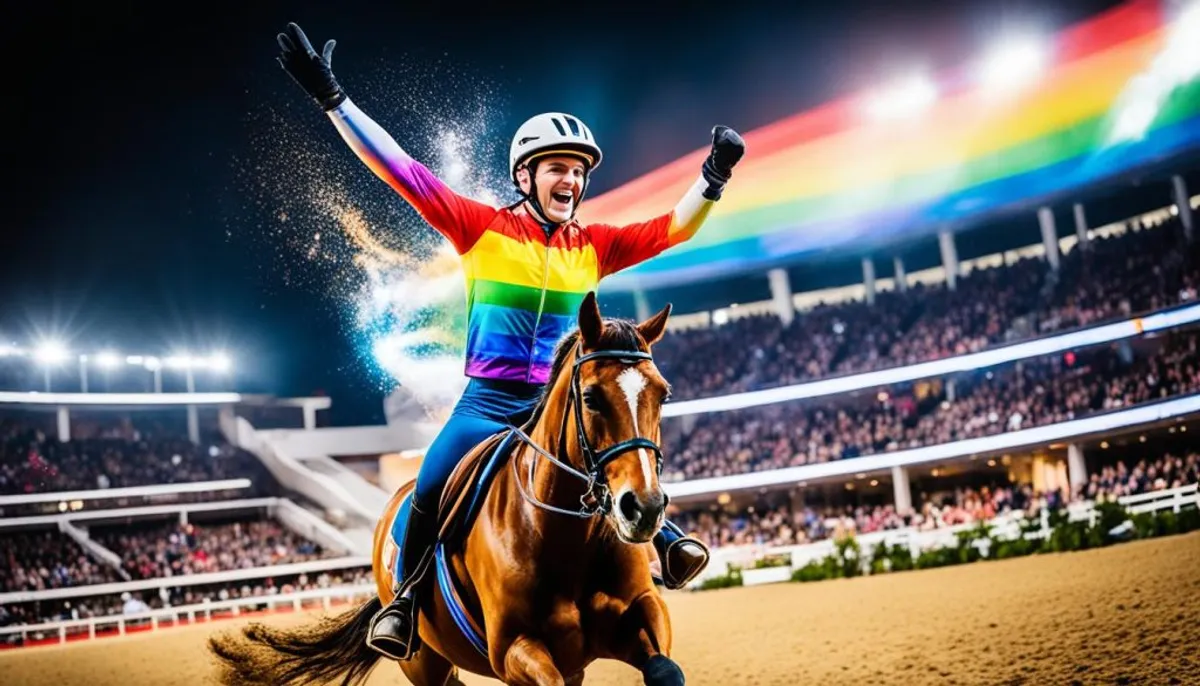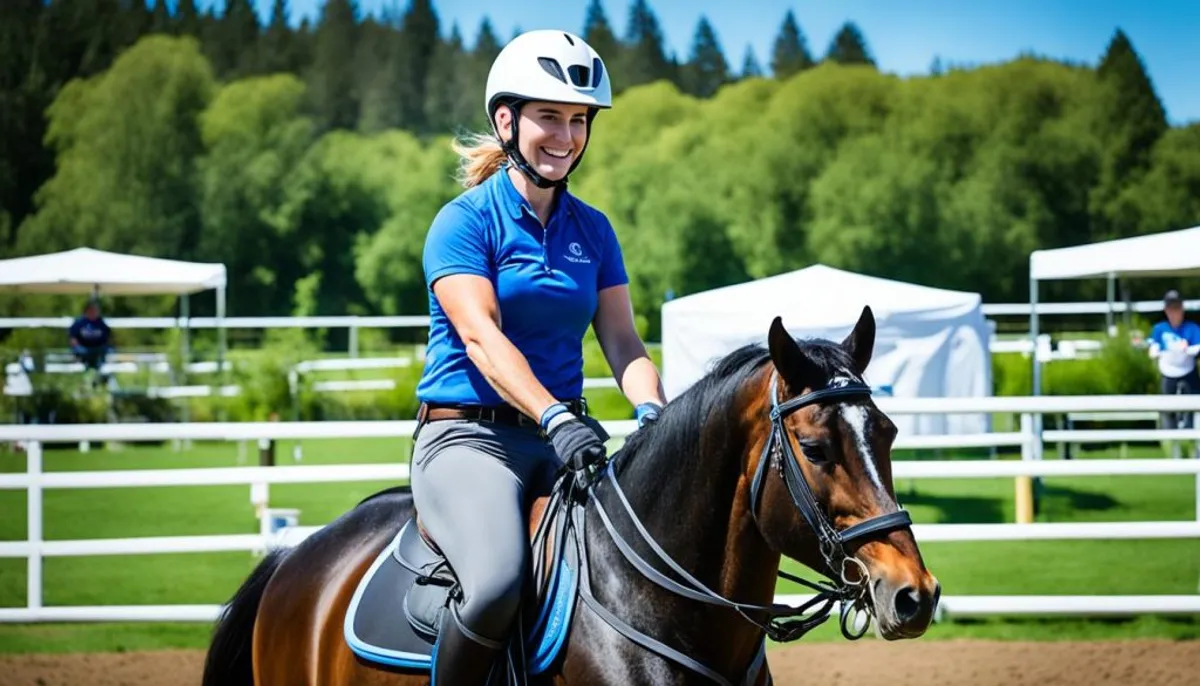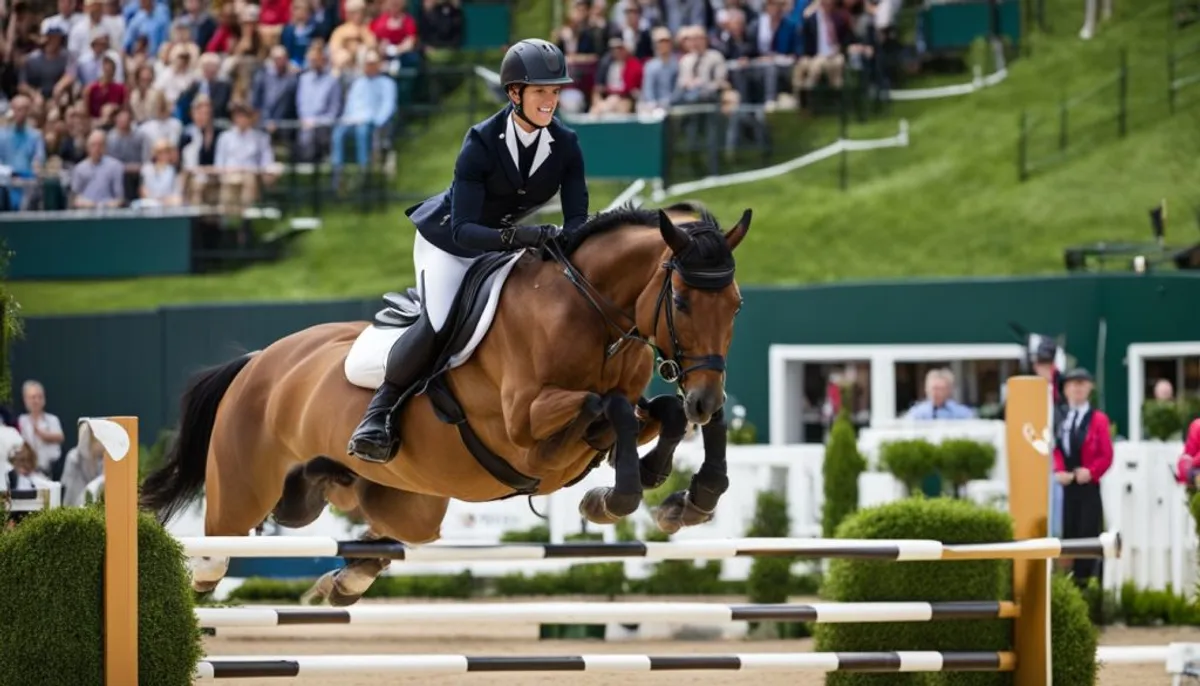Paralympic riding is more than just a sport. It is a connection between horse and inclusion, offering numerous benefits. Horses support paralympic riders, regardless of their disabilities. The French Riding Federation (FFE) works to make this paralympic equestrian sport accessible to everyone. It offers programs and disciplines such as paradressage.

Main points to remember
- Paralympic riding is an inclusive sport that offers multiple benefits to people with disabilities
- Horses play an essential role in the growth and progress of adaptive sports riders
- The French Riding Federation is committed to making this sport accessible to all
- Paradressage is a flagship paralympic discipline of equestrianism
- Adaptive riding allows participation in this sport regardless of disability
Equestrianism, an inherently inclusive activity
Equestrianism is a unique sport due to its inclusive nature. The mediator horse is sensitive and attentive, ideal for helping people with disabilities. Horses encourage interactions and communication, helping riders to thrive and integrate socially.
The horse, an ideal partner for inclusion
Equine mediation offers a unique experience for people with disabilities. The horse, which understands emotions and reacts gently, is perfect for adaptive riding and accessible riding. This helps riders gain confidence, independence, and social skills.
An accessible practice for all, regardless of disability
In France, over 150,000 people with disabilities visit inclusive riding centers. They practice equine mediation or adaptive sports riding there. The French Riding Federation works to make adaptive riding accessible to everyone. It creates specialized equipment and support for this purpose.
The therapeutic benefits of paralympic riding
Adaptive riding, or equine therapy, is more than just a sport. It offers numerous therapeutic benefits to people with disabilities. It improves their posture, motor rehabilitation, and psychological well-being.
For those affected by Alzheimer's, adaptive riding creates a special bond. It allows for communication without words. This activity offers freedom and expression, enhancing their quality of life.

Paralympic riding is a powerful therapeutic tool. Its therapeutic benefits make this activity essential for many people with disabilities. It aids in progress in motor rehabilitation and improves well-being.
| Benefits of adaptive riding | Details |
|---|---|
| Improvement of posture | Working with the horse strengthens muscles and corrects postural issues. |
| Motor rehabilitation | The necessary movements stimulate motor skills and coordination. |
| Psychological well-being | Contact with the animal and soothing physical activity promote mental well-being. |
| Special bond for Alzheimer's patients | Adaptive riding creates a non-verbal communication method beneficial for these patients. |
Paralympic riding: much more than just a sport
Adaptive riding is more than just a sport. It is a therapy that helps people with disabilities. It enhances sensory and motor stimulation, and promotes independence and self-confidence.
Sensory and motor stimulation
Riding offers a unique sensory stimulation for riders with disabilities. Their contact with the animal and the sounds of the stable stimulate their senses. It also improves their balance and coordination.
Development of independence and self-confidence
Adaptive riding has positive effects on mentality. Horses do not judge, which makes riders free and independent. This also helps to better control emotions, improving daily life. Ultimately, adaptive riding is a means to achieve well-being and personal growth.

The French Riding Federation, a driving force for inclusion
The French Riding Federation (FFE) is crucial for the inclusion of people with disabilities in equestrianism. It has created the Equi Handi Club label. This allows everyone, regardless of their disabilities, to access adaptive riding.
The Equi Handi Club label
The Equi Handi Club label helps to find accessible riding centers. It enables people with disabilities to easily integrate into the world of horses.
Paradressage, the paralympic discipline of equestrianism
Paradressage emphasizes the relationship between rider and horse, not strength. It is a paralympic discipline that shows that disability does not prevent equestrian excellence. Paralympic riders are known for their precision and delicacy.
Paradressage is an exciting challenge. It inspires those who want to push their limits, whether they have a disability or not.
Conclusion
Paralympic riding is more than just a sport, it is a unique experience. It combines inclusion and the therapeutic benefits of the horse. People with disabilities find improvements in their independence and self-confidence.
The French Riding Federation is committed to making riding accessible to all. It offers programs, labels, and personalized support.
Whether in high-level sports or more accessible activities, riding offers unique benefits. It allows everyone to enjoy the advantages of horses. It is more than just a sport, it is a tool for personal growth and integration.
Paralympic riding shows that the horse is an ally for inclusion. It allows practitioners to surpass themselves and thrive. It embodies a spirit of sharing and mutual respect.
FAQ
What is paralympic riding?
Paralympic riding is a unique sport that combines horse and inclusion. It offers numerous benefits to people with disabilities, both motor, sensory, and psychological.
How is the horse an ideal partner for inclusion?
The horse is perfect for inclusion due to its sensitivity and attention. It facilitates interactions and communication, helping people with disabilities to thrive and integrate socially.
Who can practice adaptive riding?
Adaptive riding is open to all disabilities. It offers a unique and enriching experience. In France, over 150,000 people with disabilities attend riding centers.
What are the therapeutic benefits of adaptive riding?
Adaptive riding, or equine therapy, provides numerous benefits. It improves posture, motor rehabilitation, and the psychological well-being of people with disabilities.
How does paralympic riding stimulate the senses and promote independence?
Adaptive riding stimulates the senses in several ways. It engages touch, hearing, smell, and sight. It also improves balance, coordination, and develops the independence and confidence of people with disabilities.
What role does the French Riding Federation play in inclusion?
The French Riding Federation is crucial for the inclusion of people with disabilities in the world of horses. It has created the Equi Handi Club label to identify suitable and accessible riding centers for all.
What is paradressage?
Paradressage emphasizes the relationship between the rider and the horse, more than physical strength. This paralympic discipline shows that disability does not limit equestrian excellence.
RelatedRelated articles



